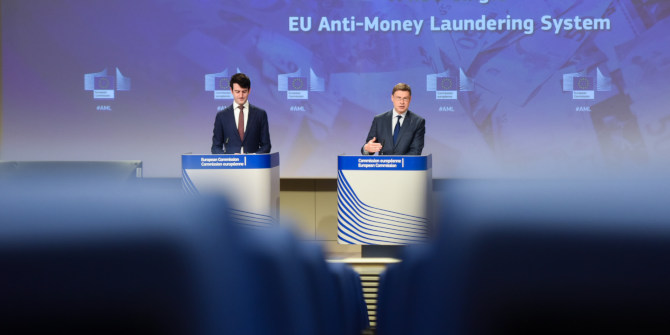 On 29 July, EU governments approved a number of new sanctions against Russia over the Ukraine crisis. Borja Guijarro-Usobiaga writes on the likely impact of the new sanctions, arguing that rather than simply using sanctions as a method for punishing Russia, they must be seen as a stepping stone to promote greater engagement with the country. He notes that alienating Russia would not only pose a problem for the crisis in Ukraine, but also for other conflicts such as the civil war in Syria.
On 29 July, EU governments approved a number of new sanctions against Russia over the Ukraine crisis. Borja Guijarro-Usobiaga writes on the likely impact of the new sanctions, arguing that rather than simply using sanctions as a method for punishing Russia, they must be seen as a stepping stone to promote greater engagement with the country. He notes that alienating Russia would not only pose a problem for the crisis in Ukraine, but also for other conflicts such as the civil war in Syria.
After months of discussions, EU leaders have finally agreed to impose the so-called “tier three” sanctions against Russia, which will target broad sectors of the Russian economy. Although this decision responds to the failure of repeated threats to deter Putin from supporting Pro-Russian rebels in eastern Ukraine, EU leaders only reached agreement after the commercial air carrier MH17 from Malaysia Airlines was allegedly shot down by the rebels.
Sanctions are expected to have an important economic cost for Russia, yet it is far from clear that this will automatically lead to a solution to the conflict. In fact, as happened with Iran, broad economic sanctions could also contribute to a further isolation of Russia. This would be highly detrimental to efforts to solve other problems worldwide, as Russia is still a key player in the United Nations and in the Mediterranean (e.g. with regard to issues like Syria).
It is also unclear whether Russia will yield to the pressure of sanctions. In fact, as the Sino-Russian meeting at the end of May showed, Putin is likely to turn to China to strengthen the economic ties with the Asian giant and to find alternative markets for Russian exports. This could undermine the effectiveness of sanctions in changing Russia’s stance towards the Ukrainian conflict.
Moreover, economic pain will not automatically translate into a change of Russian attitude. After all, Russia’s economic and security interests are not going to change in the short term. To make this point clear, the Kremlin has already threatened Ukraine with a food import ban if it ratifies the Association Agreement that it has already signed with the EU. A similar ban is likely to follow against EU fruit exports to Russia. Most worrying of all, EU and Ukrainian leaders can also expect an interruption of gas supplies to Europe this winter.
Nevertheless, economic sanctions might succeed in halting the flow of Russian arms over the Ukrainian border and in bringing an end to violence. As Jan Techau has argued, the only way of establishing a good relationship with Russia is by showing a firm position: ‘Weakness invites Russia’s disdain and aggression. Robustness creates a constructive atmosphere’. Hence, the failed Geneva talks in April might have been more successful if the threat of strong economic sanctions had accompanied the EU’s negotiating delegation.
However, the EU’s need to show resolve in its relationship with Russia points to another problem that looms on the horizon: how should the EU engage with Russia in the long term? Although sanctions might enhance the EU’s position in the current crisis and force Putin to the negotiating table, the EU needs to make clear what it expects from its eastern neighbour in the future and to design a strategy accordingly.
The EU cannot afford to repeat the mistakes of its accommodating approach to the Kremlin. This has not only failed to integrate Russia into the club of democratic nations of Europe; it has also contributed toward sustaining and strengthening an increasingly assertive, corrupt and repressive state that is willing to revise the existing sovereign order by force. Dealing with such a country will be difficult as long as the EU and its member states tolerate the authoritarian excesses of Putin.
Sanctions will strain the relationship with Russia even more. But they will also open new spaces for accommodating the interests and concerns of the two parts. The EU needs to use these opportunities to set clear and specific goals about its ambitions and expectations regarding Russia. In particular, it has to be certain that its relationship with the Kremlin can only improve if it is based on political reciprocity. This implies that the EU should be ready to back its words with economic coercion if necessary, but also that it should offer Russia incentives to co-operate.
Most importantly, the EU cannot continue expanding eastwards without expecting some political fallout in its relations with Russia. Although its promotion of Association Agreements with former Soviet countries responds to the latter’s sovereign desire to join the EU to foster economic growth and prosperity, the EU cannot simply ignore Realpolitik considerations when it proceeds with these agreements.
Finally, the EU has to reassess the possibilities of integrating its eastern neighbour into the legal and institutional framework of Europe. Change in Russia will only occur slowly and from within, but the EU can help by making its help and co-operation conditional on the achievement of specific targets. This could be achieved through the revival of existing institutional frameworks like the Organization for Security and Cooperation in Europe (OSCE).
Inevitably, the implementation of tier three sanctions is likely to occupy the minds of EU leaders in the foreseeable weeks. However, EU policy-makers would be wrong to conceive of these sanctions as a goal in themselves. Rather, they should start thinking of sanctions as a means to engage with Russia, and not simply as a punishment. Only in this way might sanctions be of help to address the “Russian problem”.
Please read our comments policy before commenting.
Note: This article gives the views of the author, and not the position of EUROPP – European Politics and Policy, nor of the London School of Economics. Feature image credit: Dmitry Boyarin (CC-BY-SA-3.0)
Shortened URL for this post: http://bit.ly/1rChJtE
_________________________________
 Borja Guijarro Usobiaga– LSE, International Relations
Borja Guijarro Usobiaga– LSE, International Relations
Borja Guijarro Usobiaga is a PhD Candidate in the Department of International Relations at the London School of Economics and Political Science. His research focuses on EU foreign policy, sanctions, human rights and democratisation processes in authoritarian regimes. He is on Twitter @BGUsobiaga





Borja, on what basis did you conclude that “EU leaders only reached agreement after the commercial air carrier MH17 from Malaysia Airlines was allegedly shot down by the rebels.” ? Nothing suggests that the aircraft was shot down by the rebels and it’s most probably has been shot down the Ukr. army where evidence suggests that the rebels did not even have the weapons capble of reaching the aircraft flying at 10km.
EU and American politicians actively supported Maidan either by personal presence or financially in Ukraine and after the revolution in February 2014 when the activists turned over the government they started to impose their radical pro-fascist views (and I mean it because those people wear symbols of the 3rd Reich) on the entire population, especially the Eastern part. The immense pressure was applied to parties of the left wing and anyone who does not share the same ideology including threats to their families. The Crimea did not want to accept it and holds the referendum. Some say the moment they were waiting for 23 years. Our media and official government did not recognise that referendum and says people were forced which is the false statement because nobody showed how thousands of people celebrated the outcome on the streets of major cities in Crimea! I don’t think you can be forced to celebrate. The general elections in Ukraine in May 2014 where the candidates represented 50 shades of brown won by Poroshenko started the military operation at the East shelling cities of Donbass with tens of thousands dead already. This operation is welcomed by most leading politicians at the West which prooves again that referendum saved Crimea from the bloodshed. It’s a shame the our politicians in the UK lie to 60 million people about what’s going on and use this situation to acuse Russia when in reality our foreign politics has been a total failure.